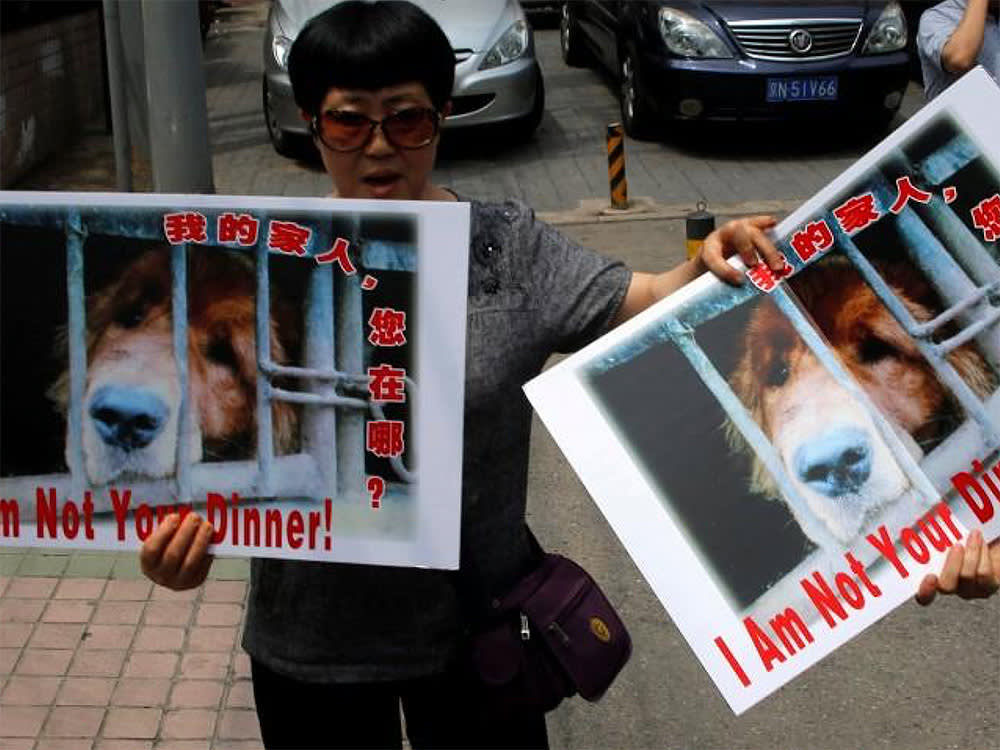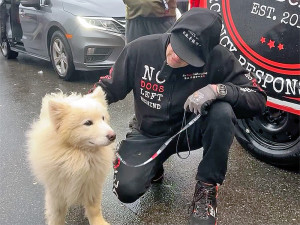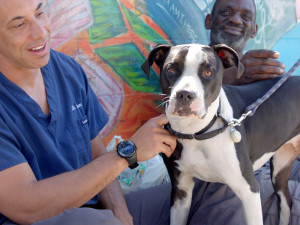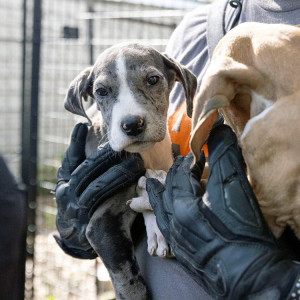How You Can Help Stop the Yulin Dog Meat Festival
On June 21, thousands of dogs will be slaughtered in Yulin, China. Organizations working to ban this barbaric event need your help to raise awareness now.

Share Article
On June 21, over a span of about 10 days, the notoriously heinous Yulin Dog Meat Festival will take place in Yulin, a city in China’s southern province of Guangxi. Since it first started in 2010, the festival has attracted tourists who gather to eat dog-based dishes, such as dog meat stew and crispy dog meat at restaurants and food stalls around the city. To feed these visitors, dogs are shipped to Yulin from around China and Southeast Asia. They are often transported in cramped, unsanitary trucks, and then kept in dirty cages until they are killed. Many of the dogs are stolen from their homes.
According to Humane Society Internationalopens in a new tab (HSI), roughly 30 million dogs are killed every year as a result of the dog meat trade in Asiaopens in a new tab, and up to two-thirds of these deaths take place in China. In 2013, reports estimatedopens in a new tab that 10,000 dogs would be slaughtered at the Yulin Dog Meat Festival alone. By 2015, though, that number was down to about 1,000. In 2020, local activists estimatedopens in a new tab that 3,000 dogs had been killed for the festival.

Get (totally free) deals for food, treats, accessories, tech, and way more pet parenting must-haves.
opens in a new tabOver the years, the festival has drawn heavy criticism both internationally and from within China. Animal activists have worked tirelessly to raise awareness of the cruelty of the dog meat industry, to encourage the Chinese government to crack down on the trade, and to rescue dogsopens in a new tab and adopt them out to good homes.
What you can do right now
Ahead of yet another year of this horrendous practice, we would also like to emphasize how you can help end it: As a start, you can sign this change.org petitionopens in a new tab started by Duo Duo Animal Projectopens in a new tab and this pledge from HSI.opens in a new tab
Peter Li, the China Policy Specialist at HSI, and Wendy Higgins, HSI’s director of international media, say that those interested in helping end the Yulin Dog Meat Festival should follow HSI, so they can be alerted to various petitions that the group launches from time to time and see how they can get involved with the work.
You can also support other groups working to end the festival, such as the Asia for Animals Coalitionopens in a new tab and the Duo Duo Project.opens in a new tab Korean K9 Rescue,opens in a new tab the Soi Dog Foundation,opens in a new tab and Harbin Slaughterhouse Survivorsopens in a new tab also work to rehabilitate and rehome dogs rescued from slaughterhouses around the region.
The other thing you can do is dismantle misinformation about this festival and help elevate the work activists are doing to put an end to it. Peter Li tells us that while he would, of course, like the dog meat trade to “shut down today,” the event is drastically smaller than it once was, and he is optimistic that activists’ efforts to close it down will be successful. “There has been momentum in China,” Li says of the activist’s strong efforts to make the festival a thing of the past. “Things are trending positively.”
We talked to Li about how this cruel event came to be, how big the dog meat trade actually is, what HSI and local activists in China are doing to help, and more.
How did the Yulin Dog Meat Festival even come about?
The Yulin Dog Meat Festival was actually created by local dog meat traders in 2010. There was no such festival in the past. I’ve been to Yulin eight times. I’ve been to the city, to the urban area, to rural areas, and I talked to many different people, including senior citizens — 70-and 80-year-olds. I asked them: “When you were a kid, did you celebrate the dog meat festival?” And the older folks would say, “We never heard about it.” Dog meat had never been celebrated before.
The festival was created in 2008, when the provincial government made a decision calling on different cities in the province to come up with specific plans to develop the local economy by utilizing local specialties. This was to attract tourism and develop industry. local [dog meat] traders talked to the local government and said, “Why don’t we do a dog meat festival?” It was something new. No one was doing it. So, that’s how it came about.
But I want to add that there is a misconception about people wanting to eat dog meat, or that there is a consumer demand for dog meat. This is a false perception. It is a consumption driven by the traders. Dog meat is not a household food. I did a survey of dog meat consumption in a city also known for dog meat sales, and the majority of people had never eaten dog meat. The majority of people have not eaten it or do not eat it.
How is it that dog meat traders became so influential?
If you go to a different city — for example Dalian, or Shanghai, or Beijing — dog meat traders are not influential at all. In these other cities, if you report a stand selling dog meat, that stand is going to be shut down. But if you go to Yulin, dog meat traders are very provocative. They have dog meat stands, dog meat restaurants.
A lot of this has to do with local government. China does not have a law explicitly banning dog meat. And the sale of dog meat is not a big industry. It’s very, very tiny. But the authorities don’t close down the traders and the slaughterhouses and restaurants, even though they’re small, because it’s hard to find jobs for people if they don’t do this.
Today’s Chinese government, if they want to shut down your business, they have to help move you to an alternative livelihood. Economically, this area is near the bottom in China. So, the local government really does not want to disrupt employment. And otherwise, they would have to pay people without these jobs unemployment benefits, or they could cause social disturbances. So, there’s a lot of concern.
The local authorities believe that eventually this trade is going to die off, probably in another 10 years. I really want the trade to shut down today, but I am optimistic that it has no future.
You mentioned that it’s a small industry. Do you have a rough estimate of how many people work in the dog meat trade in Yulin?
Yulin has two major markets that sell dog meat. One market has no more than 15 vendors. Another may have about 30. During the dog meat festival, you may see slightly more. Then you have slaughterhouses and transporters who are bringing dogs from other provinces. Then there are restaurants — there is one street called Dog Meat Restaurant Street — and you have regular restaurants that have dog meat on the menu. I would say, altogether, no more than 1,000 people work in the dog meat trade in Yulin. And the city has about a million people.
Dog meat sales in Yulin are notorious. Not because [the industry] is gigantic. It is not gigantic. But because it is outrageous. Dog meat consumption in China has traditionally been socially unacceptable. Say you are my friend, and you’re coming to my house, right? A distinguished guest. I’m going to have a family banquet, a dinner for guests from far away. I’m not going to have dog meat on the dinner table.
How do residents of Yulin and people in China feel about the festival?
The first group of people who stood up against the dog meat festival were Chinese activists. In 2011, Chinese activists, artists, media [people] started conversing with the traders and the authorities, and questioning why they were doing this.
Since then, media celebrities, movie starsopens in a new tab, singers, and of course legal experts, animal protection activistsopens in a new tab, and also legislators in China’s National People’s Congress started to submit legislative proposals to the Congress saying that this is outrageous, and that the dog meat trade should be specifically prohibited in Chinese law.
Nationally, authorities have admitted to me that the festival is a public relations disaster. For the city, for the province, and for China. That’s why the Yulin government changed their position from endorsing the festival in 2010, to disassociating from the festival in 2014.
Can you tell me about what HSI and local activist groups are doing to combat this festival?
HSI has been leading a global anti-dog meat trade campaign. China is one of the major battlegrounds, because every year, China slaughters the biggest number of dogs for the trade — close to 10 million dogs. We’ve been working with animal protection groups in China, assisting with information campaigns, telling people that dogs are more valuable than a plate of food on the table.
We also assist our local partner groups in China in their efforts to encourage law enforcement. Because if the Chinese government enforced existing laws, the [dog meat] trade would not exist. Why? Because most of the dogs slaughtered in Yulin and in other dog meat markets are stolen pets. Theft is a violation of Chinese criminal law. We believe the Chinese government should penalize whoever is selling products of theft. And also, by shipping large numbers of dogs from one location to another province, transporters violate China’s animal disease control and prevention law, which requires every individual dog to have a health certificate for shipment. The industry has been sustained by a series of activities that violate China’s existing laws, even though China does not specifically prohibit dog meat.
Third, when our partner groups rescue dogs from the dog meat trade, we provide help. We have been helping to rescue a large number of dogs. Some dogs have been successfully adopted locally, and in 2016, for example, we helped adopt 110 dogs to Canadian families. Over the years we have sent dogs to the U.K., and brought them to the United States for adoption. But most of our rescue dogs are in China for local adoption.
What else is important to underline?
One thing I want to say is that there is no tradition of dog meat consumption. 4,000 years ago, yes, but not in the last 2,000 years. Who is saying that there is a tradition of dog meat consumption? The dog meat traders. They are saying that so they can use culture and tradition to silence critics. So, let’s not get into that trap.
Secondly, the dog meat industry is very cruel, but there is a misperception that traders torture dogs on purpose so that they will taste better. And there are some videos in cyberspace. There might be individual cases of brutality. But it is not a standard industry practice. I’m not defending dog meat traders. But when I asked them: “Do you torture dogs?” They said: “We don’t have the time.” Why is that important? Animal activists anywhere should never use fake, exaggerated, or untruthful information to defeat your enemies. We have to use accurate information to defeat our enemies.
Kindness and compassion are the dominant cultural values of China. You always have a group of sick people who murder and torture animals, but these are sick people. I want to say let’s have hope. Young people in China are very much like young people in the United States. They have zero tolerance for animal cruelty. So, there is hope.

Madeleine Aggeler
Madeleine Aggeler is a freelance journalist and copywriter in Washington, D.C. Previously, she was a writer at New York magazine’s The Cut. She lives with her dog, Cleo, who works primarily as a foot warmer.
Related articles
![A couple outside with their two Beagle dogs, the woman is feeding a treat to one dog while the man is hugging the other dog]() opens in a new tab
opens in a new tabThe Beagle Freedom Project
Helps ease retired lab Beagles into new lives, and a whole new world.
![A woman holding a French bulldog over her shoulder.]() opens in a new tab
opens in a new tabBulldogs and Other Flat-Faced Breeds Are Being Banned. Here’s Why
Breeds with those squished-in faces are charming — but their health issues are not.
![Group of young people pet a brown dog with a jacket on outside.]() opens in a new tab
opens in a new tabHow DIY Animal Rescuers Tell The Exhausting, Rewarding Stories of Their Work
In volunteers’ Instagram videos, you’ll see both the joy and the fatigue behind finding these deserving pets homes.
![dr kwane street vet]() opens in a new tab
opens in a new tabDr. Kwane Hits the Streets to Treat Unhoused People’s Pets
“The Street Vet” on his heroic work and how you can help.
![The ASPCA is on the ground in Lake Butler, FL assisting with the rescue of 120 dogs and puppies from an unfit breeding operation.]() opens in a new tab
opens in a new tabThe ASPCA Rescued 300 Mistreated Dogs Across Four States in Only 30 Days
Here’s how they were able to pull off this incredible feat.
![Douglas Thron, in his rescue pilot uniform hugging a rescued black cat to his chest outside]() opens in a new tab
opens in a new tabWe Are Now Living in the Age of Drone Animal Rescue
ASSERT is the first on the ground for emergency aid around the world.











